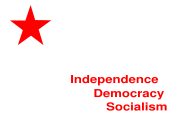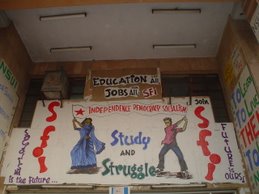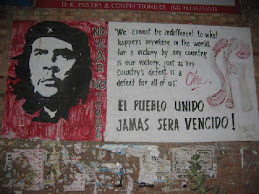AISA’s Panic and Confusion on JNUSU Elections: A Rejoinder
AISA has once again chosen to heap abuses on the SFI and mislead the student community through its pamphlet dated 31st January. That they are thoroughly confused and unwilling to take any constructive initiative is borne out by the way they have willfully distorted the arguments in favour of holding the elections as per the JNUSU constitution and avoided addressing the core issues.
PRESENT STATUS OF THE COURT CASE
The ongoing case regarding the JNUSU elections had taken a turn on 11th November, when the matter was referred to a 5 judge constitution bench. The questions posed before the 5 judge bench, inter alia, include the very constitutional validity of the Lyngdoh Committee and its recommendations. Now the 5 judge bench will deliberate on constitutional issues and is likely to take 3 to 5 years to arrive at a judgement. The question before the student community is, how to respond to this new situation? AISA and the JNUSU office bearers have singularly failed to come up with a meaningful response even after 2 months of the 11th November development. SFI along with some other student organisations have put forward a concrete proposal. It is highly unfortunate that rather than engaging with that proposal, AISA is indulging in cheap slander and mud slinging against the SFI and unnecessarily creating paranoia about contempt of court. Let us cool headedly consider the available options before the student community in the backdrop of the 11th November development.
OPTIONS BEFORE US
1. Keep on extending the tenure of the incumbent JNUSU for a period which might stretch up to 5 years. This is not a workable option since the JNUSU will get irreparably weakened with such a prolonged ad-hoc status.
2. Hold JNUSU elections by accepting Lyngdoh Committee recommendations. This is what the JSC lawyer has also suggested in a roundabout way by adopting an “internal mechanism” where candidates do not violate the age and repetition criteria. But the choice of having elections as per the Lyngdoh recommendations was available right from November 2008, when the Supreme Court had first stayed the elections. This was not accepted by the student community. Rather, a JSC was formed after a UGBM which challenged the imposition of the Lyngdoh recommendations in JNU in the Court. Two JNUSU elections were sacrificed due to the ongoing case, only because the students were not willing to accept the Lyngdoh recommendations and wanted to defend the JNUSU Constitution. Accepting the Lyngdoh recommendations at this point of time would render this entire struggle irrelevant. Moreover, accepting the Lyngdoh recommendations at a time when the Supreme Court itself is deliberating on its constitutional validity, would amount to missing an opportunity that has opened up before us.
3. In contrast to the above two options, the third option available is to hold the elections in this semester itself in accordance with the JNUSU elections. SFI, along with AIDSO, AISF, DSU and PSU, has held that this is the best option in the given situation.
THE ROADMAP
The forthcoming UGBM can pass a resolution in favour of holding elections as per the JNUSU Constitution. If such a resolution is passed, the election process can begin with the convening of the School GBMs and the election of the Election Committee. If this is challenged in the Supreme Court or if it takes suo motu cognizance, the JNU students would be asked to explain their stand. AISA is unnecessarily creating panic by suggesting that this would amount to contempt and therefore a sudden crackdown on students. This is a gross misreading of the situation (whether deliberate or otherwise). Why should the same Supreme Court, which is now deliberating on the constitutional validity of the Lyngdoh recommendations itself, crackdown on the JNU students for being unwilling to accept the Lyngdoh recommendations! In fact, it is likely that the Supreme Court agrees with the position of the JNU students and restores the JNUSU constitution, at least till the final verdict on Lyngdoh Committee is delivered. It may of course disagree with the JNU students and issue specific directives on JNUSU elections. The question of contempt will arise only if the JNU students willfully defy those specific directives. In sum, AISA is prejudging the stand of the Supreme Court on the matter, getting panicky and spreading that confusion.
The crux of the matter is whether we make a whole hearted attempt to restore the JNUSU constitution in the light of the developments in the Court case on 11th November 2009. Rather than being evasive on this count and unnecessarily complicating matters by writing abusive and verbose pamphlets, AISA as well as the JNUSU office bearers would do well to spell out their position on this core issue.
Sd/- Lenin, President SFI-JNU Sd/- P.K.Anand, Secretary SFI-JNU




